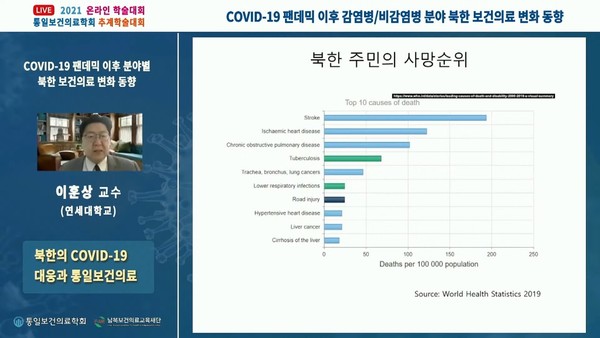The Covid-19 pandemic has hit hard North Korea’s management of infectious diseases, including tuberculosis (TB) and chronic diseases, a South Korean health expert said. To help the North, health professionals should seek inter-Korean exchanges and a global health platform, he said.
Lee Hoon-sang, a professor at Yonsei University Graduate School of Public Health, spoke on “North Korea’s Covid-19 Response and Healthcare for Korean Unification” at a conference on Friday.

Globally, reports of TB outbreaks have been declining since the outbreak of Covid-19, and the pandemic is thought to be affecting TB management, according to Lee.
In North Korea, reports of TB diagnosis had been increasing until 2019 but started to fall from 2020, Lee said.
“This does not mean that TB situation has improved, but North Korea is having more difficulties,” he said.
According to the WHO’s Global TB Report 2021, the number of TB patients in North Korea marked 135,000 last year, an increase of 3,000 from the previous year of 2019, and the TB incidence rate was 523 per 100,000 people.
The WHO listed North Korea among the 30 high TB burden countries.
However, only 66 percent of the North Korean TB patients received treatment, and the TB infection fatality was 16 percent.
Pyongyang has maintained the border lockdown policy since the outbreak of Covid-19, making it difficult to deliver drugs to fight TB or malaria.
North Korea allocated a 55.6 billion won ($47.1 million) budget to eradicate TB, but 68 percent of the budget has not been met, which would have made drug delivery difficult, news reports said.
“North Korea used border control during SARS and MERS outbreaks, and the control has become very tight in Covid-19,” Lee said. “As North Korea’s quarantine is based on lockdown, it has difficulties procuring various resources. This also affects TB and malaria control.”
He asserted that North Korea’s primary healthcare system should be strengthened to deal with chronic diseases, which account for 80 percent of deaths of North Korean people.
“The top three causes of death in North Korea are stroke, ischemic heart disease, and chronic obstructive pulmonary disease (COPD). Therefore, the need for chronic disease control is increasing,” Lee said.
“Due to Covid-19, not only advanced but developing countries have burdens of medical services for chronic diseases. So, North Korea’s primary healthcare system should be enhanced.”
Another expert said that to resolve the health inequality of North Korean people caused by the strict lockdown, a global health platform would be strategically helpful, rather than direct exchanges between the two Koreas.
Cha Ji-ho, an assistant professor at KAIST Moon Soul Graduate School of Future Strategy, said health inequality among North Koreans has worsened due to international sanctions since 2017 and the lockdown caused by the pandemic.
Under such circumstances, South Korean healthcare professionals have “needs” to interact with North Korea to meet the increasing demand for public health knowledge.
Unless security issues are resolved on the Korean peninsula, conventional inter-Korean exchanges will not be much feasible, he noted.
“Rather than sticking to conventional forms, we need to discuss whether we can form a new platform,” he said. “As Korean scholars interact with their peers in Europe, North America, and international organizations such as the WHO, they should make some room to collaborate with North Korea through a global health platform.”

